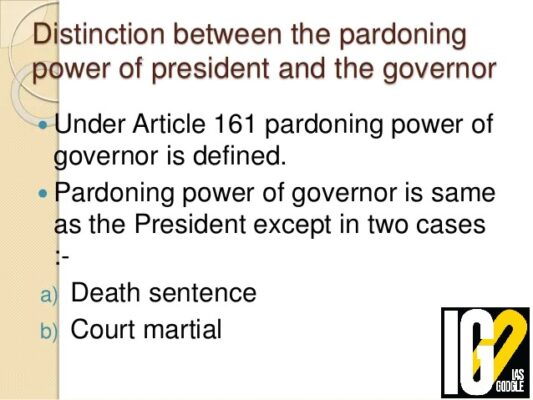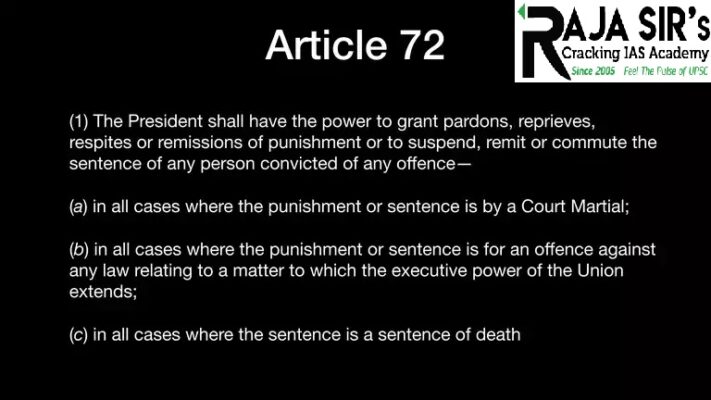- Home
- Prelims
- Mains
- Current Affairs
- Study Materials
- Test Series
16th Oct 2021
GANDHI ASKED SAVARKAR TO FILE MERCY PLEA BEFORE BRITISH
The Defence Minister of India has said that Vinayak Damodar Savarkar had filed a mercy petition before the British on Gandhiji’s suggestion.

 (1) The President shall have the power to grant pardons, reprieves, respites or remissions of punishment or to suspend or commute the sentence of any person convicted of any offence—
(a) in all cases where the punishment or sentence is by a Court Martial
(b) in all cases where the punishment or sentence is for an offence against any law relating to a matter to which the executive power of the Union extends
(c) in all cases where the sentence is a sentence of death.
There are five different types of pardoning mandated by law.
(1) The President shall have the power to grant pardons, reprieves, respites or remissions of punishment or to suspend or commute the sentence of any person convicted of any offence—
(a) in all cases where the punishment or sentence is by a Court Martial
(b) in all cases where the punishment or sentence is for an offence against any law relating to a matter to which the executive power of the Union extends
(c) in all cases where the sentence is a sentence of death.
There are five different types of pardoning mandated by law.

- He said this during the launch of the book Veer Savarkar: The Man Who Could Have Prevented Partition Partition—authored by Uday Mahurkar and Chirayu Pandit.

- As per the Constitutional framework in India, a mercy petition to the President is the last constitutional resort a convict can take when the court of law sentences him.
- The act of mercy is not the right of the prisoner.
- The Supreme Court in Kehar Singh vs Union of India restated that the pardon from the President is an act of mercy and therefore cannot be claimed as a right.
- A convict can present a mercy petition to the President of India under Article 72 of the Constitution of India.
- Similarly, the power to grant pardon is conferred upon the Governors of States under Article 161 of the Constitution of India.
- The mercy or clemency is granted on the grounds based on his health, physical or mental fitness, his family financial conditions as he is the only sole earner of bread or butter or not.
 (1) The President shall have the power to grant pardons, reprieves, respites or remissions of punishment or to suspend or commute the sentence of any person convicted of any offence—
(a) in all cases where the punishment or sentence is by a Court Martial
(b) in all cases where the punishment or sentence is for an offence against any law relating to a matter to which the executive power of the Union extends
(c) in all cases where the sentence is a sentence of death.
There are five different types of pardoning mandated by law.
(1) The President shall have the power to grant pardons, reprieves, respites or remissions of punishment or to suspend or commute the sentence of any person convicted of any offence—
(a) in all cases where the punishment or sentence is by a Court Martial
(b) in all cases where the punishment or sentence is for an offence against any law relating to a matter to which the executive power of the Union extends
(c) in all cases where the sentence is a sentence of death.
There are five different types of pardoning mandated by law.
- Pardon: means completely absolving the person of the crime and letting him go free.
- Commutation: means changing the type of punishment given to the guilty into a less harsh one, for example, a death penalty commuted to a life sentence.
- Reprieve: means a delay allowed in the execution of a sentence, usually a death sentence, for a guilty person to allow him some time to apply for Presidential Pardon or some other legal remedy to prove his innocence or successful rehabilitation.
- Respite: means reducing the quantum or degree of the punishment to a criminal in view of some exceptional circumstances, like pregnancy, mental condition etc.
- Remission: means changing the quantum of the punishment without changing its nature, for example reducing twenty-year rigorous imprisonment to ten years.
- The Governor of a State shall have the power to grant pardons, reprieves, respites or remissions of punishment or to suspend, remit or commute the sentence of any person convicted of any offence against any law relating to a matter to which the executive power of the State extends.
- There is no statutory written procedure for dealing with mercy petitions.
- But in practice, after extinguishing all the reliefs in the court of law, either the convict in person or his relative on his behalf may submit a written petition to the President.
- The President’s secretariat receives the petitions on behalf of the President, then forwards them to the Ministry of Home Affairs for their comments and recommendations.
- A convict under the sentence of death is allowed to make the petition within seven days after he gets informed about the dismissal of the appeal or special leave to appeal by the Supreme Court.
- The Home Ministry in consultation with the concerned State Government, discusses the merits of the petition.
- After the consultation, recommendations are made by the Home Minister, and then, the petition is sent back to the President for his decision.
- The President and Governor cannot exercise their discretion with regard to their powers under Articles 72 and 161. Both are required to act on the advice of the appropriate government–Central and State Government.
- The advice of the appropriate Government binds the Head of the state.
- The Constitution doesn’t provide for a specified time limit to accept/reject the mercy petition. The President can keep the petition in abeyance for an indefinite period if he wishes to.
- The scope of the pardoning power of the President is under Article 72.
- The President’s power to grant pardon extends to the cases where a Court Martial has awarded the sentence or punishment.
- The President can grant a pardon in all cases, including the death sentence.
- The pardoning power of the Governor is under Article 161.
- The Governor’s power does not extend to the cases where a Court Martial has awarded the sentence or punishment.
- The pardoning power of the Governor doesn’t extend to the death sentence.

- GatiShakti means the power of speed, is an ambitious, comprehensive geospatial digital platform that promises integrated planning and coordinated execution by connecting all concerned departments on one platform.
- The platform uses powerful technologies like Geographic Information System-based Enterprise Resource Planning with 200+ layers of evidence-based decision making, planning tools for route planning, dashboard-based periodic monitoring, and the latest satellite imagery.
- It has been developed by BISAG-N (Bhaskaracharya National Institute for Space Applications and Geoinformatics).
- The plan will include all existing & planned initiatives of various ministries and departments in one centralised portal, enabling different departments to prioritise their projects through cross-sectoral interactions.
- Sixteen central government departments, including Railways, Roads and Highways, Petroleum and Gas, Power, Telecom, Shipping, Aviation and others, will be part of this initiative.
- Gati Shakti will incorporate the infrastructure schemes of various Union ministries and state governments — Bharatmala, Sagarmala, UDAN, inland waterways, dry/land ports etc.
- To holistically integrate the interventions of various Ministries/Departments and address missing gaps to ensure seamless movement of people, goods & services to minimise disruptions, ensuring quick completion of works with cost-efficiency.
- To provide a macro and micro view of existing and developing infrastructure in layers that depict completion timelines.
- Comprehensiveness: Each department will now have visibility of each other’s activities providing critical data while planning and executing projects.
- Prioritisation: Through this, different departments will be able to prioritise their projects through cross-sectoral interactions.
-
POSTED ON 16-10-2021 BY ADMIN
Next previous









 Latest News
Latest News
 General Studies
General Studies